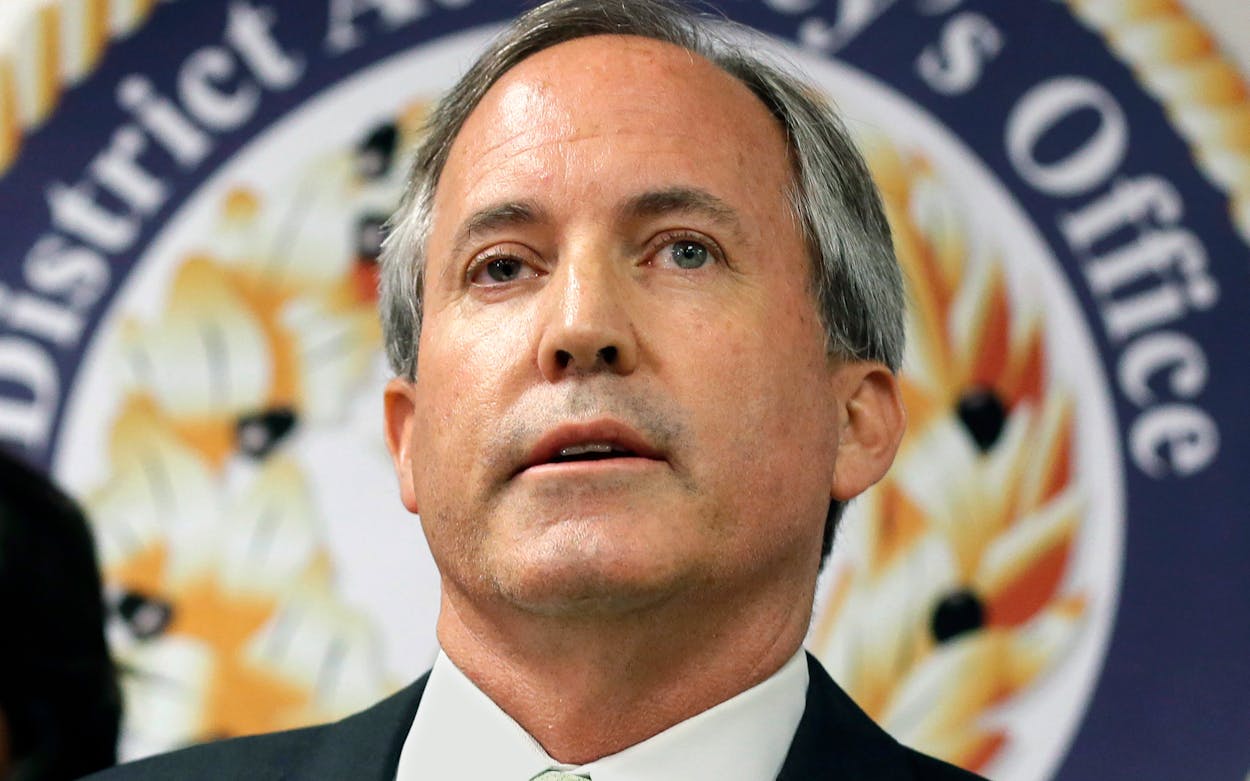At long last, Ken Paxton, the disgraced and suspended attorney general of Texas, will appear in a courtroom eight years after he was first charged on two counts of felony securities fraud in 2015. Paxton, with help from influential friends, has been able to postpone the case for nearly a decade with endless motions and hearings about venue changes, and by trying to cut the county funding paid to the special prosecutors tasked with holding him to account. That approach has been successful for years, but it may now backfire.
Though the first hearing is Thursday, the criminal trial, which will be held in Houston, most likely won’t commence in full until after Paxton’s impeachment trial in the Texas Senate in September. In Austin, Paxton risks losing his office. In Houston, by contrast, Paxton risks state jail time, up to a maximum of 99 years. But the cases aren’t entirely distinct. The impeachment trial could determine what happens to Paxton in his criminal trial, and in any future trials relating to his many other alleged misdeeds.
As long as Paxton is attorney general, he has powerful backers. A faction of the Republican Party of Texas, financed by wealthy and powerful figures such as Midland oilman Tim Dunn and the Wilks brothers of Cisco, put him in office and want to keep him there. That faction has mounted a running defense of Paxton the last eight years. Allied lawmakers helped him get his trial postponed by applying pressure in Collin County, where the criminal proceeding was initially supposed to be held. Financial backers have contributed to Paxton’s reelection campaigns. Most recently, a group that opposes impeachment, financed in large part by Dunn, even gave $3 million to Lieutenant Governor Dan Patrick, who is supposed to act as the impartial judge of the trial in the Senate. And allies of Dunn are ready to fund primary opponents for those who vote to convict.
Most importantly, Paxton’s backers have contributed millions of dollars to his defense fund. Paxton has repaid them with legal favors: issuing AG rulings on their pet issues, such as cracking down on the political activities of teachers, and backing up Dunn’s now-defunct political group Empower Texans when it ran afoul of the Texas Ethics Commission. Paxton arguably has gotten the better of the relationship. If you owe a bank a million dollars, the saying goes, the bank owns you. If you owe a bank a billion dollars, you own the bank. Paxton and his backers have a similar relationship. The attorney general is so indebted to his allies that he is too precious to be lost. An attorney general appointed by the governor, such as Paxton’s hypothetical replacement, wouldn’t owe as much to them—at least not initially. Paxton has become a black hole for their money and their arm-twisting exertions, and as long as he’s embattled they’re going to keep throwing bills in.
That money, however, isn’t free of contingencies: the attorney general is valuable because of his power. Paxton may well skate on the twenty impeachment charges the House sent to the Senate. (This week, his lawyers asked the Senate to dismiss all but one.) But what if he is convicted? If he’s stripped of his office, he’s no longer useful to the faction to which he owes his power, and his spiraling legal mess becomes the problem of one tired man instead of a right-wing champion. The campaign cash will peter out. Paxton’s rich friends may still donate to his legal defense fund out of sympathy or charity, but that will be the only reason. The lawyers representing him on his criminal cases, such as Houston criminal defense attorney Dan Cogdell, are expensive.
There was a good reason for Paxton to fight to postpone the securities fraud trial. If convicted, he (most likely) couldn’t be attorney general; Paxton once issued legal guidance that felons are barred from seeking office in Texas. But, ironically, if Paxton had gone to trial right after the criminal indictments dropped, he would have been able to do so with the best lawyers money could buy in Texas. Because he waited, he faces the prospect of going into his criminal trial with a lot fewer wealthy friends.
Paxton’s best hope is to stay in office at all costs, where he’ll be insulated from the consequences. This is becoming something of a theme in the United States and abroad. Benjamin Netanyahu, in Israel, faces sweeping corruption charges that have been accumulating since 2018—so he must stay prime minister, where he can protect himself. Closer to home, Paxton’s court date in Houston became public the same day as Donald Trump’s indictment on four charges related to his attempt to overturn the 2020 election. As former Texas congressman Will Hurd, now a longshot candidate for the Republican presidential nomination, recently noted, Trump isn’t running for president to make America great again, again; he’s “running to stay out of prison.” Like Trump, Paxton’s best shot at beating back the indictments is to regain political power.
- More About:
- Politics & Policy
- Texas Legislature
- Ken Paxton
- Houston








